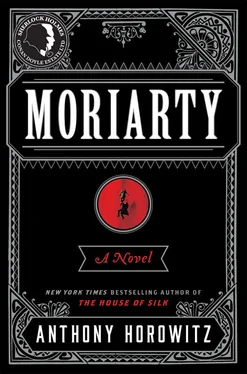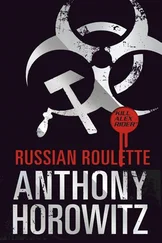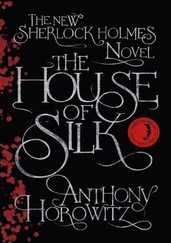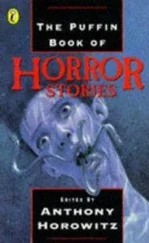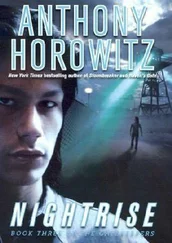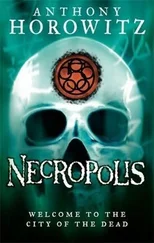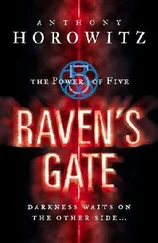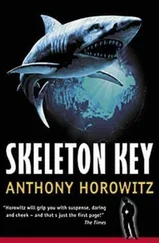‘Is there no chance that he could have survived?’ The speaker was young and smartly dressed, about halfway down the table. ‘After all, his body has never been found.’
‘That much is true, Forrester,’ Lestrade agreed. ‘But we have all read the letter.’
‘I was at that dreadful place,’ Jones said. ‘If he fought Moriarty and fell, I am afraid there is very little chance that he could have been saved.’
Lestrade shook his head solemnly. ‘I’ll admit that I’ve been wrong about one or two things in the past,’ he said. ‘Particularly where Sherlock Holmes was concerned. But this time I have looked at the evidence and I can tell you without any doubt at all that he is dead. I would stake my reputation on it.’
‘We should not pretend that the loss of Sherlock Holmes is anything short of a catastrophe,’ the man sitting opposite me said. He was tall with fair hair and as he spoke, Jones whispered to me, ‘Gregson.’ He continued: ‘You mentioned the Lauriston Gardens affair, Lestrade. Without Holmes, it would have gone nowhere. Why, you were about to search the whole of London for a girl called Rachel when in fact it was Rache , the German for revenge, that the victim had left as a final clue.’ There were quite a few smiles around the table at that and one or two of the detectives laughed out loud.
‘There is one silver lining to the cloud,’ Inspector Youghal said. ‘At least we’ll no longer find ourselves being caricatured by his associate, Dr Watson. I was of the view that his scribblings did our reputations no good at all.’
‘Holmes was a damned odd fellow,’ a fifth man exclaimed. As he spoke, he rubbed his eyeglass between finger and thumb as if he were adjusting it to better see the others in the room. ‘I worked with him, you know, on that business with the missing horse. Silver Blaze. A very strange individual. Sherlock Holmes, not the horse. He had a habit of speaking in riddles. Dogs that bark in the night, indeed! I admired him. I liked him. But I’m not at all sure I will miss him.’
‘I was always suspicious of his methods,’ Forrester concurred. ‘He made it all sound easy enough and we took him at his word. But is it really possible to tell a man’s age from his handwriting? Or his height from the length of his stride? Much of what he said was unsound, unscientific and occasionally preposterous. We believed him because he got results, but it was not a sound platform for modern detective work.’
‘He made fools of all of us,’ exclaimed yet another inspector. ‘It’s true that I also benefited on one occasion from his expertise. But is it not the case, perhaps, that we were becoming too dependent on Mr Holmes? Did we ever solve anything without him?’ He turned to the colleagues on his left and right. ‘As hard as it is and as ungrateful as it may sound, perhaps we should embrace his going as an opportunity for us to achieve results on our own two feet.’
‘Well said, Inspector Lanner.’ It was MacDonald who had spoken and now all eyes were on him. ‘I never met Mr Holmes myself,’ he continued in his thick Scottish accent. ‘But I think we are agreed that we owe him our thanks and our respect and it’s now time to move on. For better or for worse he has left us on our own and, having acknowledged as much, let us consider the matter at hand. He picked up a sheet of paper that had been lying in front of him and read from it. ‘Mr Scott Lavelle, tortured and his throat cut. Henrietta Barlowe, smothered. Peter Clayton, a petty criminal who was known to us, stabbed. Thomas Jerrold and Lucy Winters strangled. An entire household in a respectable suburb wiped out in the course of one night. We cannot have it, gentlemen. It cannot be allowed.’
Everyone in the room murmured their agreement.
‘And as I understand it, these are not the first atrocities that have taken place recently in Highgate. Lestrade?’
‘You are right. There was a death not one month ago, a young man by the name of Jonathan Pilgrim. Hands tied, shot in the head.’ Lestrade gazed at me as if I had been the one responsible and for a moment I felt the anger rise within me. I had been close to Pilgrim. It was his death, more than anything, which drove me on in my pursuit of Clarence Devereux. But I understood this was simply Lestrade’s manner. He meant nothing by it. ‘Pilgrim carried papers that showed him to be an American only recently arrived in the country,’ he continued. ‘He must have had an interest in Lavelle as his body was found only a short distance from Bladeston House.’
I felt it was time for me to speak out and so I did.
‘Pilgrim was investigating Clarence Devereux,’ I said. ‘I myself sent him to this country for that purpose. Devereux and Lavelle were working in collaboration and must have somehow discovered my agent. It was they who killed him.’
‘But in that case, who killed Lavelle?’ Bradstreet asked.
MacDonald held up a hand. ‘Mr Chase,’ he said, ‘we have been given a full explanation of your presence in London by Inspector Jones and I must say that it is only due to the exceptional circumstances of this case that you find yourself here today.’
‘I’m grateful for it.’
‘Well, you have him to thank. We will hear from you shortly. But it seems to me that if we are going to get to the bottom of these appalling murders, we need to go back to the very start… even to the Reichenbach Falls.’ He turned to an inspector who had not so far spoken. This was a slight, grey-haired individual who had been nervously picking his nails and who looked like someone who never wanted to be noticed. ‘Inspector Patterson,’ he said, ‘you were responsible for the apprehension of Moriarty’s gang. You helped to drive him abroad. I think you should share with us exactly what occurred.’
‘Certainly.’ Patterson did not look up as he spoke, as if his report were engraved in the tabletop. ‘You are all aware that Mr Holmes approached me last February although it had been his intention, I think, to meet with Lestrade.’
‘I was on another case,’ Lestrade explained with a scowl.
‘In Woking, I believe. Well, yes, in your absence, Mr Holmes came to me and asked for my co-operation in the identification and arrest of a gang that had been operating in London for some time—or so he said—and in particular, one man.’
‘Professor Moriarty,’ Jones muttered.
‘The very same. I have to say that at the time the name was unknown to me and when Holmes explained that he was famous throughout Europe for some theory he had devised and, moreover, that he had held the Chair of Mathematics at one of our most prestigious universities, I thought he was making fun of me. But he was of the utmost seriousness. He referred to Moriarty in the very darkest terms and went on to furnish me with evidence that could leave no doubt of what he said.
‘By the beginning of last month, assisted by Inspector Barton here, I had drawn together a schematic—you might say a map—of London that showed an extraordinary, interlinking network of criminality.’
‘With Moriarty at the centre,’ Barton added, puffing on his pipe.
‘Indeed. I might add that we were assisted by a great number of informers who suddenly chose to come forward. It was as if, sensing Moriarty’s weakness, they seized this moment to get their revenge, for there was no doubt that he had ruled by intimidation and threat. We received anonymous letters. Evidence of his past crimes—about which we had no knowledge whatsoever—suddenly came to light. Moriarty’s journey from obscurity to centre stage was a very short one and, at a given signal from Holmes, for he was most particular about the timing, we pounced. In the course of a single weekend, we made arrests in Holborn, Clerkenwell, Islington, Westminster and Piccadilly. We entered houses as far afield as Ruislip and Norbury. Men of the utmost respectability—teachers, stockbrokers, even an archdeacon—were taken into custody. On the Monday, I was able to telegraph Holmes who was by this time in Strasbourg and inform him that we had the entire gang.’
Читать дальше
